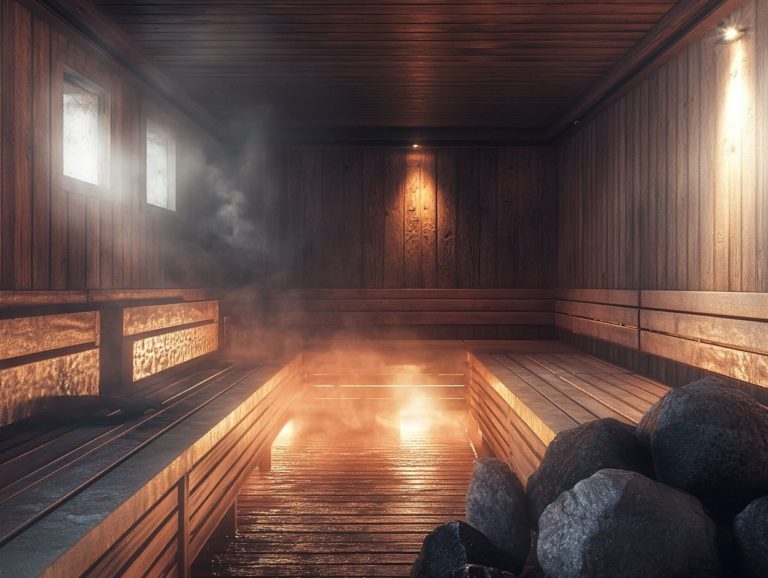What Type of Sauna Is Best for You?
Saunas have long been celebrated for their relaxing and rejuvenating effects. However, with a variety of options available, selecting the right one can feel overwhelming.
From traditional wood-burning saunas to sleek modern infrared models, each type presents unique benefits tailored to your preferences. This article will guide you through the different sauna types, highlighting their physical and mental health advantages while helping you choose the best fit for your lifestyle. Understanding the various sauna features will help you make a better decision.
You ll also find essential safety precautions to ensure your sauna experience is enjoyable and effective.
Don t wait! Dive in now and discover the perfect sauna that transforms your wellness journey!
Contents
- Key Takeaways:
- Types of Saunas
- Benefits of Saunas
- Choosing the Right Sauna for You
- Safety Precautions for Sauna Use
- Frequently Asked Questions
- What type of sauna is best for you?
- What is the difference between a traditional sauna and an infrared sauna, including wood-burning sauna and electric sauna options?
- Can I use a sauna if I have medical conditions?
- Are outdoor or indoor saunas better?
- Do I need a lot of space for a sauna?
- What type of wood is best for a sauna?
Key Takeaways:
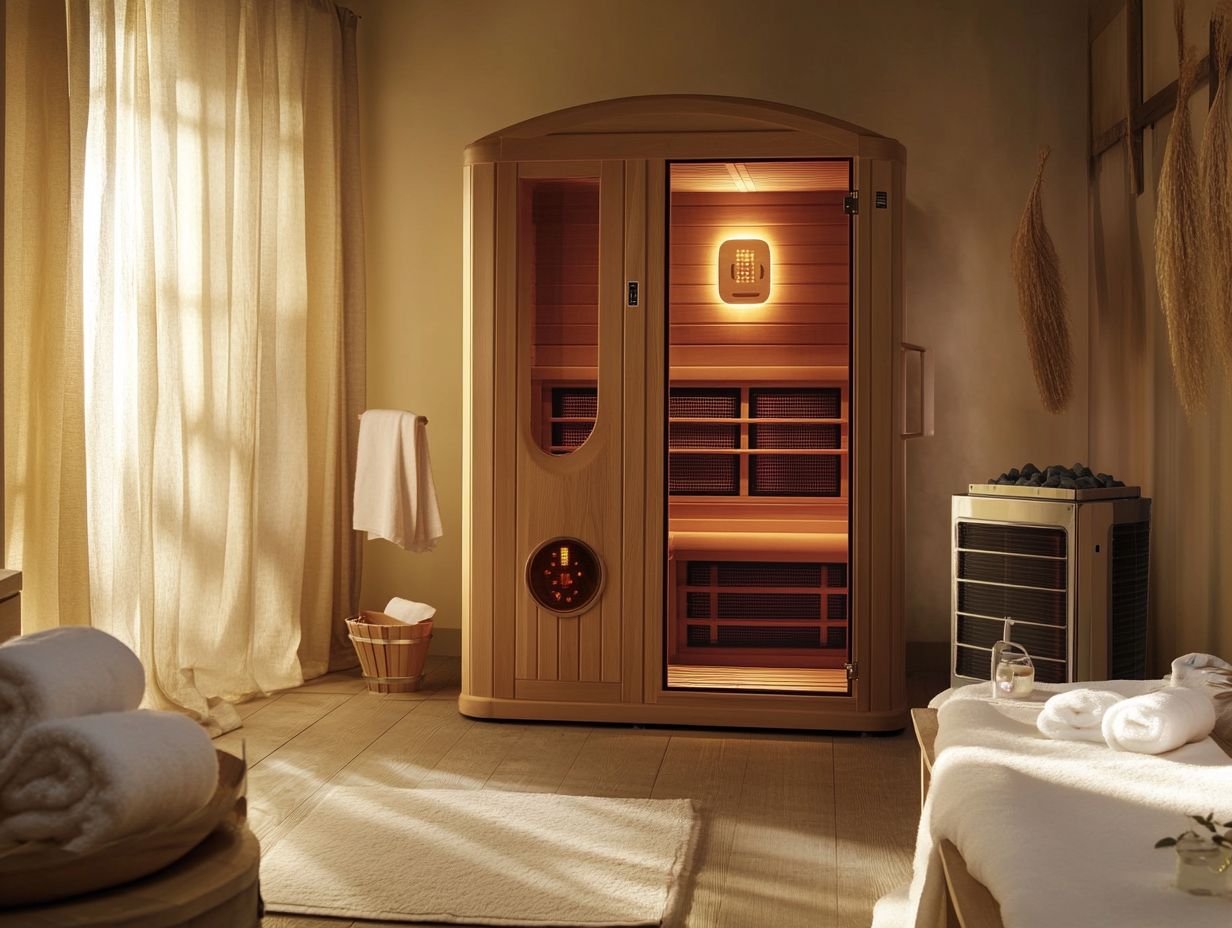
- Traditional saunas use high heat and low humidity, while infrared saunas use low heat and high humidity. Choose based on your preferences and health needs.
- Saunas can boost circulation and reduce stress, providing both physical and mental health benefits. Consult your doctor to align sauna use with your health goals.
- Consider space, budget, and personal preferences when choosing a sauna. Always follow safety guidelines to ensure a safe experience.
Types of Saunas
Saunas present an array of options, each designed to cater to your unique preferences and needs. You’ll find traditional saunas, infrared saunas, steam saunas, wood-burning saunas, and electric saunas, each offering its own distinct experience and benefits.
Traditional saunas, rooted in Finnish culture, provide high temperatures paired with low humidity, creating a unique atmosphere for relaxation. In contrast, infrared saunas use infrared light to warm your body directly, allowing for benefits at lower temperatures.
Each type of sauna enriches your experience and offers specific health advantages related to relaxation, detoxification, and your overall well-being, including improved cardiovascular function and emotional health.
Traditional Saunas
Traditional saunas, especially the Finnish variety, are celebrated for their high temperatures and low humidity, fostering relaxation and rejuvenation.
Many traditional saunas feature beautiful wooden interiors made from cedar or spruce. This not only looks appealing but also creates a calming atmosphere, making your sauna installation a worthwhile investment.
Heating methods can vary, but wood-burning stoves remain a favored option, infusing the space with a unique warmth and aroma that elevates the experience.
Historically, saunas have served as communal spaces for social gatherings and wellness rituals, often recognized for their health benefits.
The health benefits of regular sauna sessions are impressive. They can boost cardiovascular function by elevating heart rate and circulation, while also providing deep relaxation that alleviates stress and nurtures mental well-being.
Infrared Saunas
Infrared saunas offer a distinct experience compared to traditional saunas. They use infrared light to directly warm your body, enabling you to enjoy benefits at lower temperatures while still gaining significant health rewards.
This innovative method enhances detoxification, allowing your body to eliminate toxins more efficiently. Users frequently report relief from chronic pain and noticeable improvements in both emotional and physical health. The gentle warmth penetrates deeply into your muscles, promoting relaxation and easing tension that builds from daily stressors.
As your core temperature rises, circulation improves, aiding in faster recovery from injuries and enhancing your metabolic function.
Ultimately, this experience elevates your sense of well-being, offering a holistic approach that nurtures both body and mind.
Steam Saunas
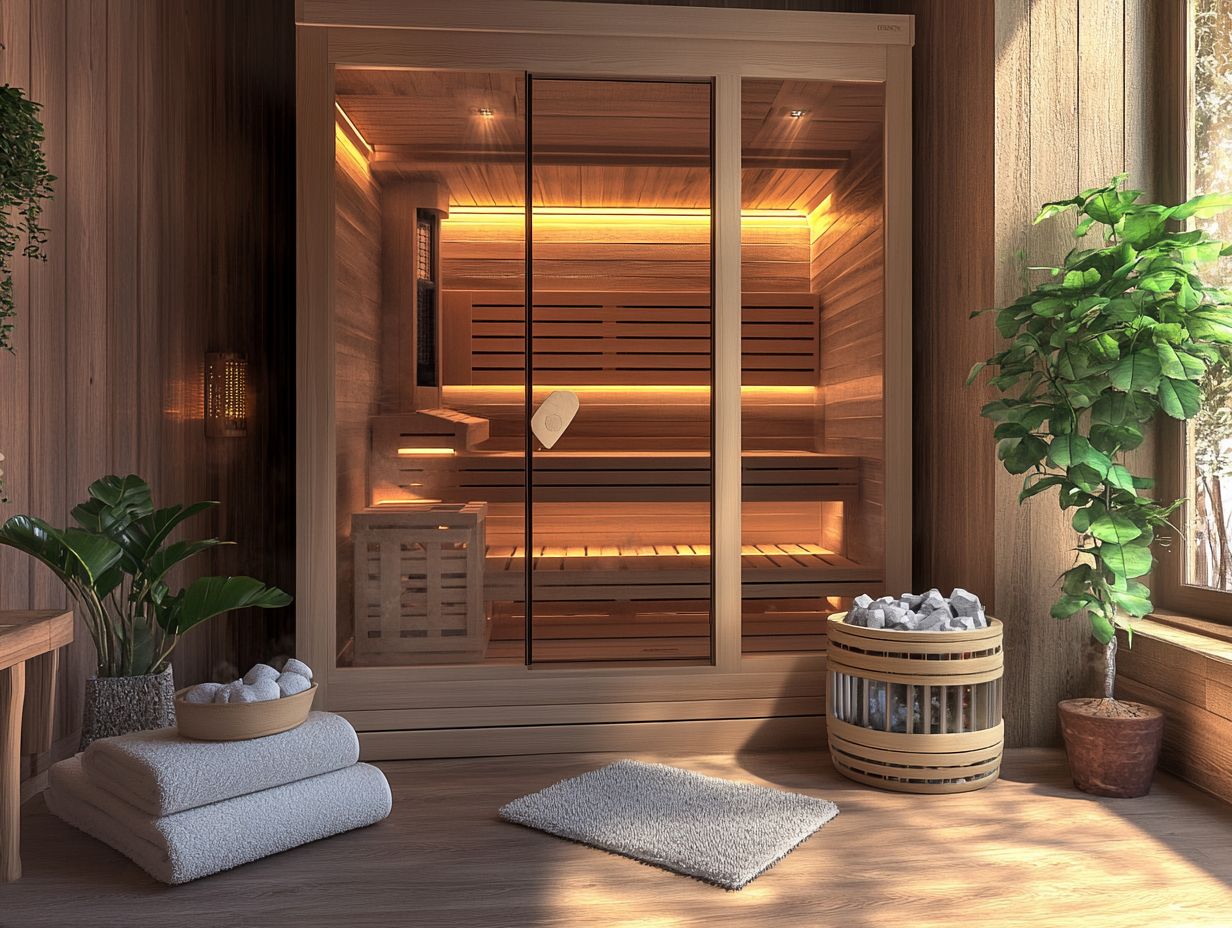
Steam saunas, with their inviting high humidity levels, create a soothing environment that can be exceptionally beneficial for your respiratory health and skin hydration. This is especially true for those experiencing respiratory issues.
Unlike their dry counterparts, steam saunas envelop you in a warm, moist atmosphere that encourages deeper breathing while enhancing your body’s ability to release toxins through sweat. This unique setting makes sauna sessions particularly advantageous if you’re looking to boost skin elasticity or alleviate conditions like asthma and allergies.
The experience is not just enjoyable; it also promotes relaxation and stress relief. To fully benefit from this rejuvenating escape, regular maintenance of the steam sauna is essential for ensuring both its effectiveness and hygiene.
Benefits of Saunas
The benefits of saunas extend well beyond simple relaxation. They offer a range of health advantages, including improved heart function, removing toxins, and enhanced emotional well-being.
You can also enjoy incorporating sauna therapy into your wellness routine, which can enrich both your physical and mental health.
Physical Health Benefits
Regular sauna use brings remarkable physical health benefits. This includes enhanced detoxification through sweat and relief from chronic pain, making it an ideal option for those who prioritize their well-being.
Engaging in sauna sessions promotes better circulation as the heat causes your blood vessels to dilate. This significantly improves blood flow and nutrient delivery throughout your body, supporting muscle recovery and reducing soreness after exercise.
The act of sweating helps flush out toxins and contributes to a cleaner, healthier system. Many individuals find that consistent visits to the sauna provide relief from conditions like arthritis and muscle tension.
When considering sauna installation, think of it as a long-term investment in your overall wellness!
Mental Health Benefits
Get ready to discover how sauna therapy can uplift your mood and enhance your well-being! It plays a significant role in improving your emotional health by providing a sanctuary for relaxation and stress relief.
As you step into the inviting warmth of the sauna, the gentle heat and soothing ambiance create the perfect backdrop for unwinding after a chaotic day. Regular sauna sessions not only promote relaxation techniques but also lift your spirits by boosting endorphin production those delightful natural mood enhancers.
As you immerse yourself in this tranquil experience, you may notice your worries gradually melting away. This paves the way for a clearer mind and greater emotional resilience.
Choosing the Right Sauna for You
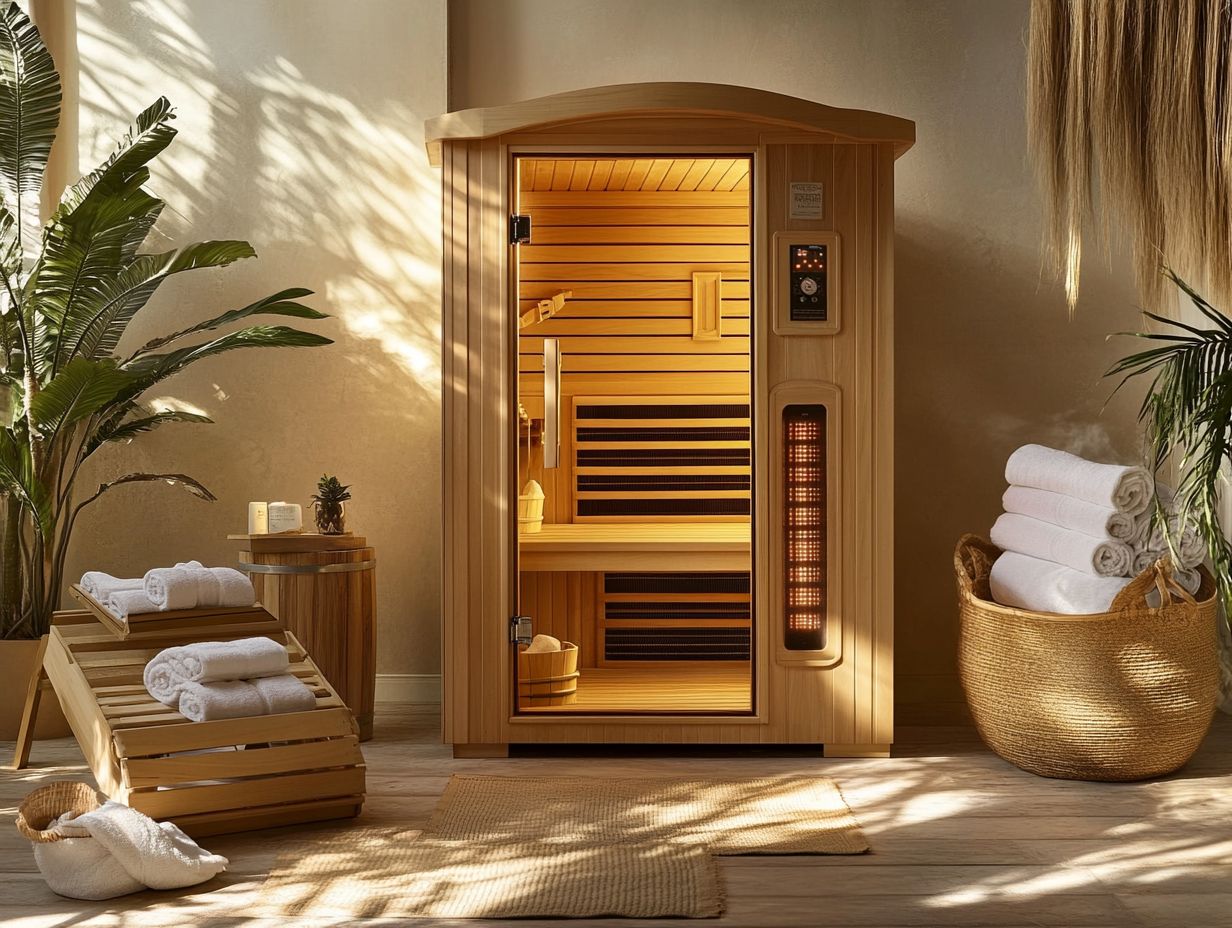
When selecting the perfect sauna, consider several factors. Think about your personal preferences, the space you have available for installation, and your budget, as costs can vary significantly depending on the type and features you choose.
Experience the amazing benefits for yourself and transform your health!
In summary, sauna therapy offers numerous benefits for both physical and mental health. Regular sessions can improve your circulation, promote relaxation, and enhance your overall well-being.
Considerations for Personal Needs and Preferences
When selecting a sauna, it s crucial to evaluate your personal needs and preferences. Consider the types of saunas you favor, the features you desire, and the overall experience you seek.
Consider factors such as the heat source. This refers to how the sauna heats up, which can be electric, wood-burning, or infrared. This choice profoundly impacts the quality of your experience.
The size of the sauna is equally significant. A compact model might be perfect if you’re working with limited space, while a larger option can accommodate family or friends, enhancing the enjoyment.
Reflect on whether you prefer a portable sauna that offers flexibility and mobility or a permanent installation that adds a luxurious touch to your home. Each option presents distinct advantages tailored to various lifestyles and aspirations, making thoughtful consideration essential in your decision-making process.
Safety Precautions for Sauna Use
To ensure a safe and effective sauna experience, follow these safety tips to make the most out of your sauna experience! It s essential to adhere to specific safety precautions and guidelines. This approach will help you maximize the health benefits while minimizing any potential risks associated with sauna use.
Guidelines for Safe and Effective Use
To ensure a safe and effective sauna experience, it’s vital for you to follow specific guidelines tailored to your health conditions and the type of sauna you re using. This will maximize your sauna benefits.
Before you immerse yourself in that soothing heat, consider limiting your sessions to 15-20 minutes for optimal safety. Staying hydrated is just as crucial. Make it a point to drink water before and after your sauna time to replenish lost fluids and maintain your electrolyte balance.
It’s wise to check your body temperature now and then. If you start feeling lightheaded or excessively warm, it’s time to step out. By adopting these practical measures, you can fully relish the myriad benefits of sauna bathing like relaxation, improved circulation, and detoxification while minimizing any potential risks.
Frequently Asked Questions
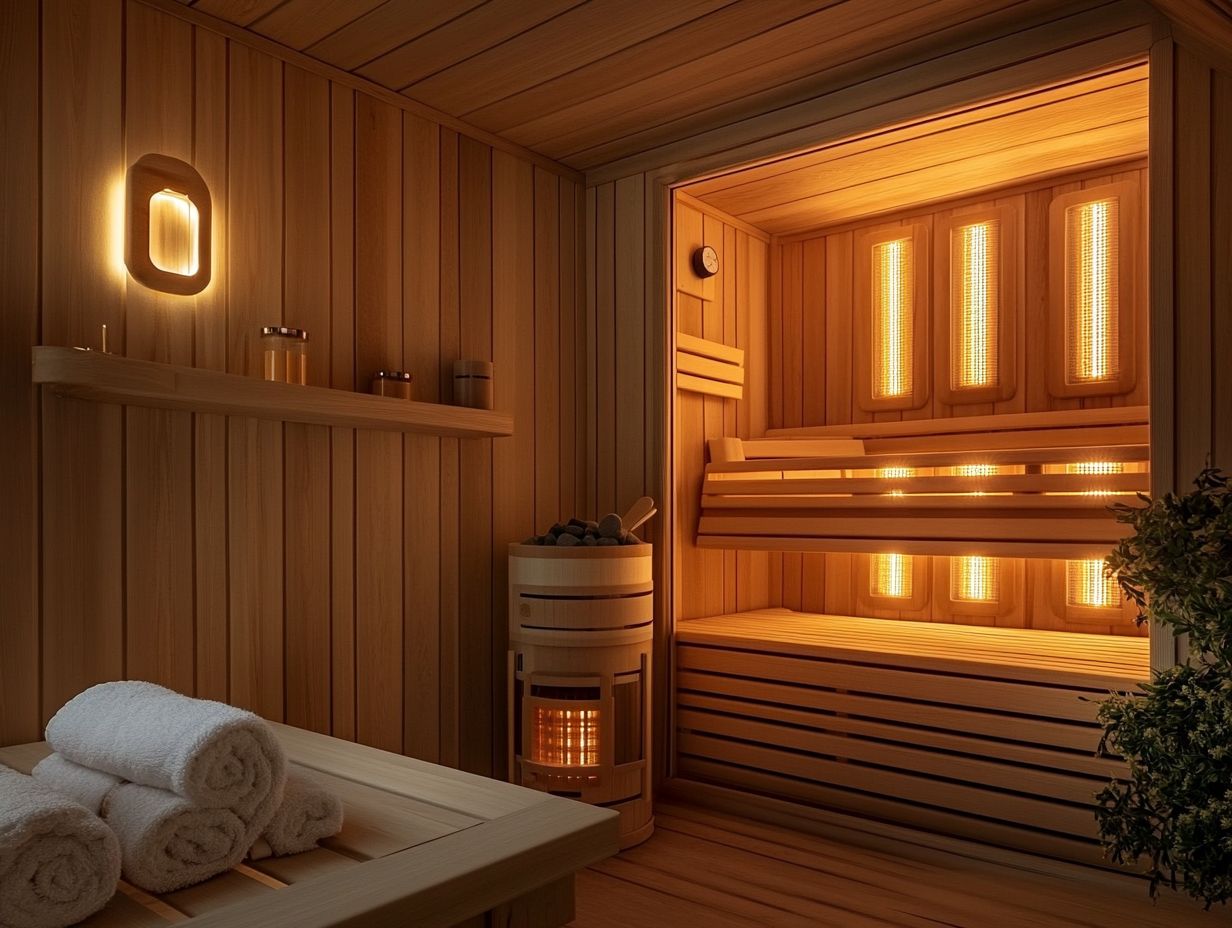
What type of sauna is best for you?
The best type of sauna for you depends on your personal preferences and needs. Some factors to consider are the size of the sauna, the type of heat source, and the materials used in construction.
What is the difference between a traditional sauna and an infrared sauna, including wood-burning sauna and electric sauna options?
A traditional sauna uses heated rocks to produce dry heat, while an infrared sauna uses infrared light to directly heat the body. Traditional saunas are typically hotter, while infrared saunas are more gentle and may be preferred by those with respiratory issues.
Can I use a sauna if I have medical conditions?
It is important to consult with your doctor before using a sauna if you have any medical conditions. Some medical conditions may be worsened by the heat and humidity of a sauna, while others may benefit from the detoxifying effects.
Are outdoor or indoor saunas better?
Both outdoor and indoor saunas have their benefits. Outdoor saunas offer a more natural and tranquil setting, while indoor saunas are more convenient and may be used year-round regardless of weather conditions.
Do I need a lot of space for a sauna?
The amount of space you need for a sauna depends on the size of the sauna you choose. There are compact options available for smaller spaces, while larger saunas may require a dedicated room or outdoor area.
What type of wood is best for a sauna?
Cedar is a popular choice for sauna wood due to its natural resistance to moisture and bacteria. Other common woods used for saunas include hemlock, spruce, and pine. Ultimately, the best wood for your sauna will depend on your personal preferences and budget.
Curious about which sauna fits your lifestyle? Read on!
Choosing the right sauna can enhance your well-being and relaxation. Remember to consider your personal needs, preferences, and safety as you embark on this journey to enjoy the health benefits of sauna use.

